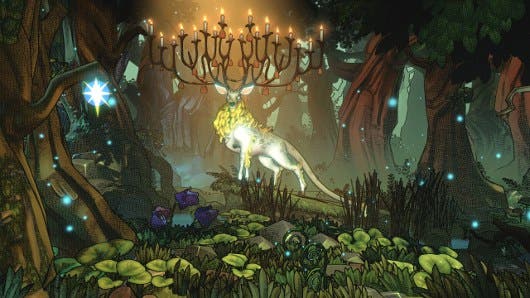How the Kinect exclusive Fantasia messes with the classics
Easy come, easy go.
Change is scary. Hearing Ziggy Stardust intermittently throughout one's life means the last thing you'd want to do is alter David Bowie's 70s classic glam rock anthem. But Harmonix's upcoming Fantasia: Music Evolved encourages players to muck about with their most beloved tunes. This doesn't always sound amazing, but more often than not, Fantasia's player inputs sounds wonderful in ways you'd never imagine.
The basic gameplay involves dancing/punching/karate chopping your way through a series of onscreen prompts sort of like a musical Fruit Ninja, but between sections you're given the opportunity to choose between one of three versions of a song for various instruments. There's always the original track for purists, but if you ever wondered what Ziggy Stardust would sound like as a chiptunes affair or jazz club ditty, there are options for that.
Play with two players and whoever performs best during each section gets to make this choice. Sometimes this is aggravating, such as when I play with Disney's Chris Nicholls who decides to replace David Bowie's vocals with a synthesised Robot Bowie (the fiend!). But when he opts to re-imagine Bohemian Rhapsody's midsection as a classical ballad I initially resist, but am pleasantly surprised by the results.
"It's really about discovery," says Nicholls. "Every song is like a playground. We don't tell you you have to remix [a song]. You can stay on the classic if that's what you want to do. But we find that once you start to blend it, once you play with the ideas, it's very hard to go back."
He's right - sacrilegious as it may seem to mess with the likes of the Thin White Duke - and player input goes much deeper than a multiple choice selection of covers. By completing stages you'll be able to rejuvenate various hub worlds by petting them with your magical pixie dust, and this unlocks "Composition Spells," which are tools for composing your own riffs. These are then interjected during certain parts of songs the way new blocks appear in Super Mario World's stages after hitting a flip switch.
Composition Spells let you craft your own solos through various mini-game-like interfaces. One lets you touch various crystals to dictate the horn section, while another has you glazing over various panels on a sphere to determine a guitar riff. These spells can be performed infinite times until you find a version you're happy with, then you just let it fly like a certain mouse once did with sentient brooms.
Watching Fantasia being played can be distracting with its obtuse symbols, gestures, composition mini-games and a complete lack of text, which initially makes me think that it will be too hard for kids to grasp. When I pose this concern to the developer Nicholls tells me that the studio has had plenty of focus-testing with children and they're usually able to pick up Fantasia: Music Evolved right away.
"People often underestimate how flexible and intuitive children can be," he says, before noting that it's usually adults who find it alien to reshape their favourite tunes. "It comes to rediscovering how to be expressive again."
"There is a lot of truth to that," senior designer Jonathan Mintz adds. "We let kids share the remixes on YouTube because kids listen to remixes of music now and every YouTube video has a slew of remixes that it'll link to. So we've actually found that a lot of kids totally pick up the remix and get the idea, whereas adults are like 'how dare you mess with Freddy Mercury!'"
He's right. Old hats like me find it almost unthinkable to want to alter the dulcet tones of Mr. Mercury, but young ones less familiar with the classics are more susceptible to tinker with such timeless tunes.
You might be wondering what business The White Stripes or Queen have merging with early 20th century Disney designs, but Harmonix considers its video game rendition of the 1940 film to be a natural extension of Walt's original vision of "an adventure of colour, sound and motion."
"Just as Fantasia represented Disney at its most experimental, it's only fitting that Harmonix's Kinect-based offering is equally out there."

"The whole goal with this set out by Chris and the team at Disney was to look at the goals of the original project. So not so much to remake the film as an interactive experience, but to look at what Walt Disney was trying to do," Mintz explains. "When Walt was having stenographers taking down his meeting notes he was talking to animators and saying 'the purpose of this project is to interpret the music.' Animators were used to animating something, then the composer would come in and score to the animation, whereas Walt was like 'no, we're going to flip that around. You're going to listen to the music and we're going to work from that.'"
"That was basically giving people a new way to experience music and so the original goal from the film was to essentially add more segments and change it over time. That didn't actually happen, but we pretended it did and said 'hey, had it lived for many decades later, some segments would still be in there - like Bald Mountain is still in there - but we'd put in Bohemian Rhapsody in the 70s and add more modern stuff from there.'"
Nicholls adds that the original 1940 film "was born of a time where you went to the theatre and sat very respectfully and just sort of appreciated the artistry of others, but that's not where we are in the 21st century. We want to record and edit and interact. That's really the big difference for us."
This concept of rearranging pop tunes is not only new to Fantasia, but new to Harmonix as well after its long stint making Guitar Hero and Rock Band products. "Your peak is like being the best cover band in the world," Mintz says of Rock Band. "Here it's a playground where each song starts out straight ahead, but you perform well and you can transform it in really surprising, weird ways... Things can get strange but you're not going to get any tonally offensive things. All of those instruments are carefully tuned so you feel like you are influencing that."
Just as Fantasia represented Disney at its most experimental, it's only fitting that Harmonix's Kinect-based offering is equally out there. Fantasia began as a wordless beast, and aside from some crooning it remains at least a textless one. It's not an easy game to describe, and at a distance it looks like the world's most abstract workout regime, but go with it anyway. You just might discover an all new, most excellent way to rock out to Queen.
Party on, Wayne.


